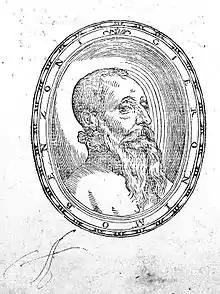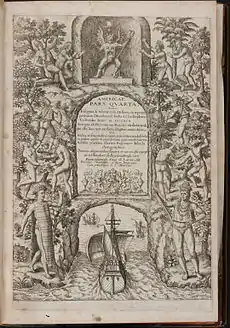Girolamo Benzoni
Girolamo Benzoni (born at Milan about 1519; died after 1572 in Spain) was an Italian conquistador and merchant who wrote a popular account of his travels.

Life
In 1541, at the age of twenty-two, Girolamo Benzoni travelled from his hometown of Milan (Italy) to Sanlúcar de Barrameda, Spain, and then on to the New World. He claims to have been seeking adventure and fortune. He spent fifteen years in the territories conquered and being exploited by the Spaniards, travelling widely through the West Indies, Central America and South America, and visiting: the Caribbean (Greater and Lesser Antilles), Guatemala, Nicaragua, Mexico, Panama, Peru, and Venezuela. After losing much of the 'few thousand ducats' he had accumulated in a shipwreck on his way home, he finally arrived back in the port town of Sanlúcar de Barrameda (Spain) on 13 September 1556, with nothing more than his wealth of experiences. Subsequently, he returned to Italy. In the dedication of his first edition he claims to have been born of humble parentage and unable to go to college. He also says his father sent him throughout Europe, one assumes on business. He then writes a new dedication in the second Italian edition in 1572. After that nothing is known of Benzoni.
Exactly what he was doing in the New World is not clear: he attached himself to various military expeditions though he was not by nature a fighting man; he reveals a good knowledge of political intrigue but does not apparently become involved in politics; he is informed about economics but does not discuss the commodities he traded in.
Works

Benzoni's Historia del Mondo Nuovo was published at Venice in 1565 and was dedicated it to Pope Pius IV. The book purported to present facts and describe events that Benzoni himself had witnessed. Since there was controversy at the time, concerning treatment of Native Americans, a work by someone who had both spent 15 years in the New World and was willing to criticize colonists, could not fail to attract attention.
Controversy came to surround that Historia del Mondo Nuovo itself. Critics claimed that Benzoni included many factual errors and often in intentional misstatements; suggested that the author had limited education and very narrow views; was motivated by hatred of the Spanish people and government, against whom it made many diatribes and accusations; had the tone of a disappointed trader, motivated by a lack of personal success, despite protections given to him by Spanish authorities and favors that he acknowledged only reluctantly; did not faithfully report Benzoni's own experiences; failed to notice mitigating circumstances and tended to ignore positive aspects of colonisation. In particular, it was alleged, Benzoni's book included a clumsy rehash of Bartolomé de Las Casas's accounts of the Antilles, and made many factual errors regarding the conquest of Mexico and conquest of Peru. The ultra-philanthropists found in Benzoni a welcome auxiliary. This was especially the case in countries vying with Spain to establish colonies in the Americas.
Several editions of Benzoni's writings were published in rapid succession, including translations into at least five languages.[1] In 1572, the original edition of the Historia was reprinted; in 1579, translations into French and German appeared, by Eustace Vignon and Nicolaus Höniger (German Wikipedia article: Nicolaus Höniger) respectively. An 1857 edition by Admiral W. H. Smyth, published in London by the Hakluyt Society, under the title,History of the New World, by Girolamo Benzoni, of Milan: Shewing his Travels in America, from A.D. 1541 to 1556: with some Particulars of the Island of Canary [sic], was the only English translation until the publication of a new edition by Jana Byars and Robert Schwaller at Penn State University Press in 2017.[2]
See also
References
External links
 Media related to Girolamo Benzoni at Wikimedia Commons
Media related to Girolamo Benzoni at Wikimedia Commons